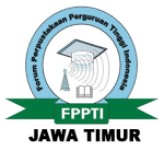When Plagiarism Is A Matter
Downloads
The high education world is retested with resurfacing the plagiarism practice of the scientific papers in the academic community. The Plagiarism joins in the realm of academic integrity, where the honesty of the scientific process and the contributions of others in a paper of an academic community should be recognized in.
The software of Plagiarism detection on the paper can be used to reduce the risk of plagiarism and academic integrity. However, the information sharing and appropriate learning about the plagiarism issue itself is more important for improving the understanding which directs the behavior of anti-plagiarism.
This Literature Study give a line description on raising awareness of plagiarism. It is not only higher education's responsibility, but also primary and secondary education. The Application of Information Literacy program earlier will assist in the formation of individuals who are away from plagiarism behavior.
Downloads
Adesile, I., Nordin, M. S., Kazmi, Y., and Hussien, S. et al. (2016) Validating Academic Integrity Survey (AIS): An Application of Exploratory and Confirmatory Factor Analytic Procedures. Journal of Academic Ethics, 14, pp. 149. Doi:10.1007/s10805-016-9253-y
Badriah, S. (2009). Upaya perpustakaan dalam meningkatkan literasi informasi siswa: Studi kasus Perpustakaan Sekolah An-Nisaa Pondok Aren-Bintaro (Skripsi). UIN Syarif Hidayatullah, Jakarta.
Bernardi, R. A., Banzhoff, C. A., Martino, A. M., & Savasta, K. J. (2012). Challenges to Academic Integrity: Identifying the Factors Associated With the Cheating Chain. Accounting Education, 21(3), 247-263. doi:10.1080/09639284.2011.598719.
Busch, P. and Bilgin, A. (2014). Student and Staff Understanding and Reaction: Academic Integrity in an Australian University, Journal of Academic Ethics 12, 227–243. DOI 10.1007/s10805-014-9214-2
Cronan, T. P., Mullins, J. K., and Duglas, D. E. (2015). Further understanding factors that explain freshman business students' academic integrity intention and behavior: plagiarism and sharing homework, Journal of Business Ethics. DOI 10.1007/s10551-015-2988-3.
Jetta Culpepper, (2008). Teacher Resource Center, Reference Reviews, 22(5), pp.26 - 27
Khan, Z. R. and Balasubramanian, S. (2012). Students go click, flick and cheat: E-cheating, technologies and more, Journal of Academic and Business Ethics, 6, pp. 1-26.
Marseno, R., Kusuma, W. A., dan Saleh, A. R. (2014). Identifikasi literasi informasi dalam rangka pengembangan kurikulum di sekolah dasar, Jurnal Pustakawan Indonesia, 13(1). Http://mail.student.ipb.ac.id/index.php/jpl/article/view/8768
Nicholas Joint. (2005). eLiteracy or information literacy: which concept should we prefer?, Library Review, 54 (9), pp. 505 – 507. http://dx.doi.org/10.1108/00242530510629506
Nurhayati, A. (2016). Big6 (six) dalam mensukseskan kurikulum 2013 (implementasi literasi informasi kelas IV SD Muhammadiyah Sapen yogyakarta): naskah lomba inovasi pembelajaran guru SD tingkat nasional Tahun 2016. Yogyakarta: SD Muhammadiyah Sapen.
Secker, J. (2004). Electronic resources in the virtual learning environment: a guide for librarians. Available online on http://eprints.lse.ac.uk/4884/1/E-learning_and_information_literacy_(LSERO).pdf
Pertiwi, A. R. P. (2016). Literasi informasi aktivis Himpunan Mahasiswa Islam Majelis Penyelamat Organisasi Koordinator Komisariat Universitas Islam Negeri Sunan Kalijaga Yogyakarta Periode 2014/2015 (Skripsi). UIN Sunan Kalijaga Yogyakarta Yogyakarta Indonesia.
Schubert Foo , Shaheen Majid , Intan Azura Mokhtar , Xue Zhang , Yun-Ke Chang , Brendan Luyt , Yin-Leng Theng , (2014) "Information literacy skills of secondary school students in Singapore", Aslib Journal of Information Management, 66 (1), pp. 54 – 76. http://dx.doi.org/10.1108/AJIM-08-2012-0066.
Sunarni, T. (2015). Korelasi literasi informasi dan indeks prestasi kumulatif mahasiswa program studi teknik informatika di Universitas Kristen Duta Wacana (UKDW) (Tesis). UIN Sunan Kalijaga, Yogyakarta.
Wahidaturrohmah, R. (2014). Studi literasi informasi pustakawan di Perpustakaan Pusat Universitas Gadjah Mada Yogyakarta berdasarkan model the Big6 (Skripsi). UIN Sunan Kalijaga, Yogyakarta.
Wahyuni, N. C. (2016). Saya, Pustakawan, Bersuka Cita Atas Kehadiran Kurikulum 13. Dalam M. Mursyid, M. (ed.), Membumikan Gerakan Literasi di Sekolah (307-316). Yogyakarta: Ladang Kata.
Williams, d. A. And wavell, d. A. (2006). Information literacy in the classroom: secondary school teachers' conceptions. Final report on research funded by society for educational studies research report 15 department of information management (formerly the school of information and media), aberdeen business school, https://www.rgu.ac.uk/file/conceptions-of-information-literacy-report-pdf-1mb.
Record and Library Journal by Unair is licensed under a Creative Commons Attribution-ShareAlike 4.0 International License.
1. The journal allows the author to hold the copyright of the article without restrictions.
2. The journal allows the author(s) to retain publishing rights without restrictions
3. The legal formal aspect of journal publication accessibility refers to Creative Commons Attribution Share-Alike (CC BY-SA).
4. The Creative Commons Attribution Share-Alike (CC BY-SA) license allows re-distribution and re-use of a licensed work on the conditions that the creator is appropriately credited and that any derivative work is made available under "the same, similar or a compatible license”. Other than the conditions mentioned above, the editorial board is not responsible for copyright violation.



 57201398420
57201398420

























